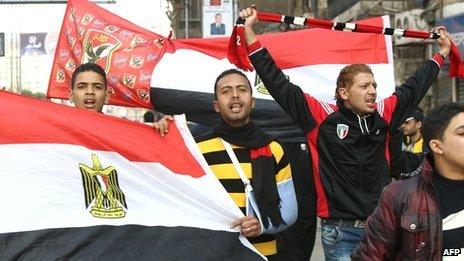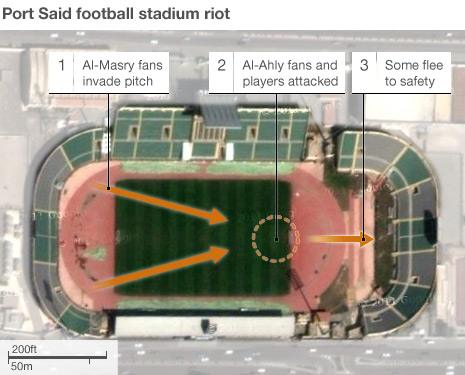Darker side of Egyptian football
- Published

Egyptian football fans are some of the most passionate in the world
Football has long been a positive factor in the lives of many Egyptians, a ray of light in the dark alley of poverty, unemployment and political repression that, until last year's revolution, was their lot.
This is why Egyptian football fans are some of the most passionate in the world, renowned for religious-style devotion to their teams.
The visual and vocal displays they put on during matches are very much part of the culture of the Egyptian game, intimidating many an opponent through the years.
Yet while Egyptians may have the rightful reputation as one of the world's most passionate fans, they also have a dark side which inevitably manifests itself when things do not go their way on the pitch.
Fan-related violence is even more pronounced when it comes to fans of the country's most successful club al-Ahly.
Their behaviour on the terraces remains one of the most talked about issues in Egyptian football.
The great Cairo club, known as the Red Devils, has a hardcore element known as Ultras, and they have a particular reputation for violence.
Much of this violence can be traced to hostilities between al-Ahly Ultras and rival factions of clubs like al-Masry and Zamalek.
The rivalry between al-Ahly and the smaller al-Masry can be traced back to the fact that, in al-Masry fans' eyes, al-Ahly have "everything" - money, support, sponsorship, and are arrogant as a result.
The fact that al-Masry's former coach Hossam Hassan is an al-Ahly legend does not help matters.
Mayhem threatens almost every match involving these teams, and police usually respond in large numbers.
When you speak to Egyptian football fans, particularly those of an al-Ahly or al-Masry persuasion, they exude a sense of ownership over their team.
Not only do al-Ahly and al-Masry supporters hurl crude insults at each other during matches, they also dislike each other intensely.
'Orgy of violence'
I experienced first-hand the dark side of Egyptian football back in 2003 when covering the final of the African Champions League, the continent's most prestigious club tournament.
Within seconds of Nigerian club Enyimba defeating local side Ismaili, missiles rained down on the pitch as fans vented their anger at their team's performance.
As there were hardly any visiting supporters, the Ismaili fans picked on anyone they suspected of not being one of them, namely the police.
Being black, I stuck out like a sore thumb in a sea of Arab faces. One shirtless fan started shouting obscenities in my direction, thinking I was a Nigerian journalist.
From that moment, the crowd grew even more frenzied, and another supporter grabbed a small BBC satellite on the edge of the VIP stand and threw it at police officers trying to arrest another fan.
Before I knew it, an officer in riot gear had whisked me away to the safety of the dressing rooms.
I was to stay there for the next five hours as we waited for the orgy of violence which had shifted away from the terraces into the streets of Ismailia to end.
When things eventually calmed down, I saw a scene outside the ground that resembled the aftermath of a bomb blast - cars with smashed out windows and all kinds of debris strewn everywhere.
The tragic loss of life during Wednesday's match further tarnishes the image of a country that has produced African legends like Mahmoud El-Khatib, Mahmoud El-Gohary and Hossam Hassan.
